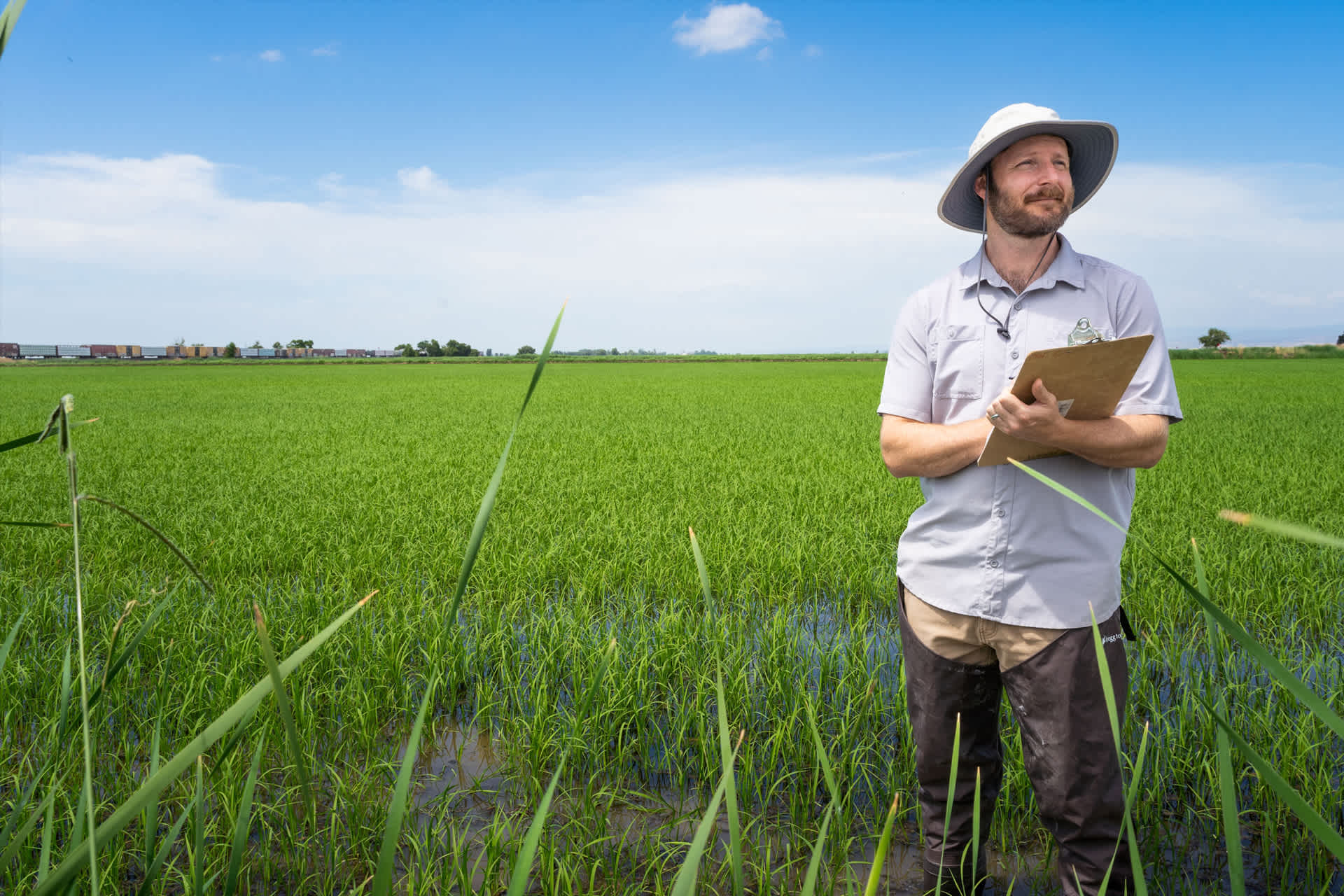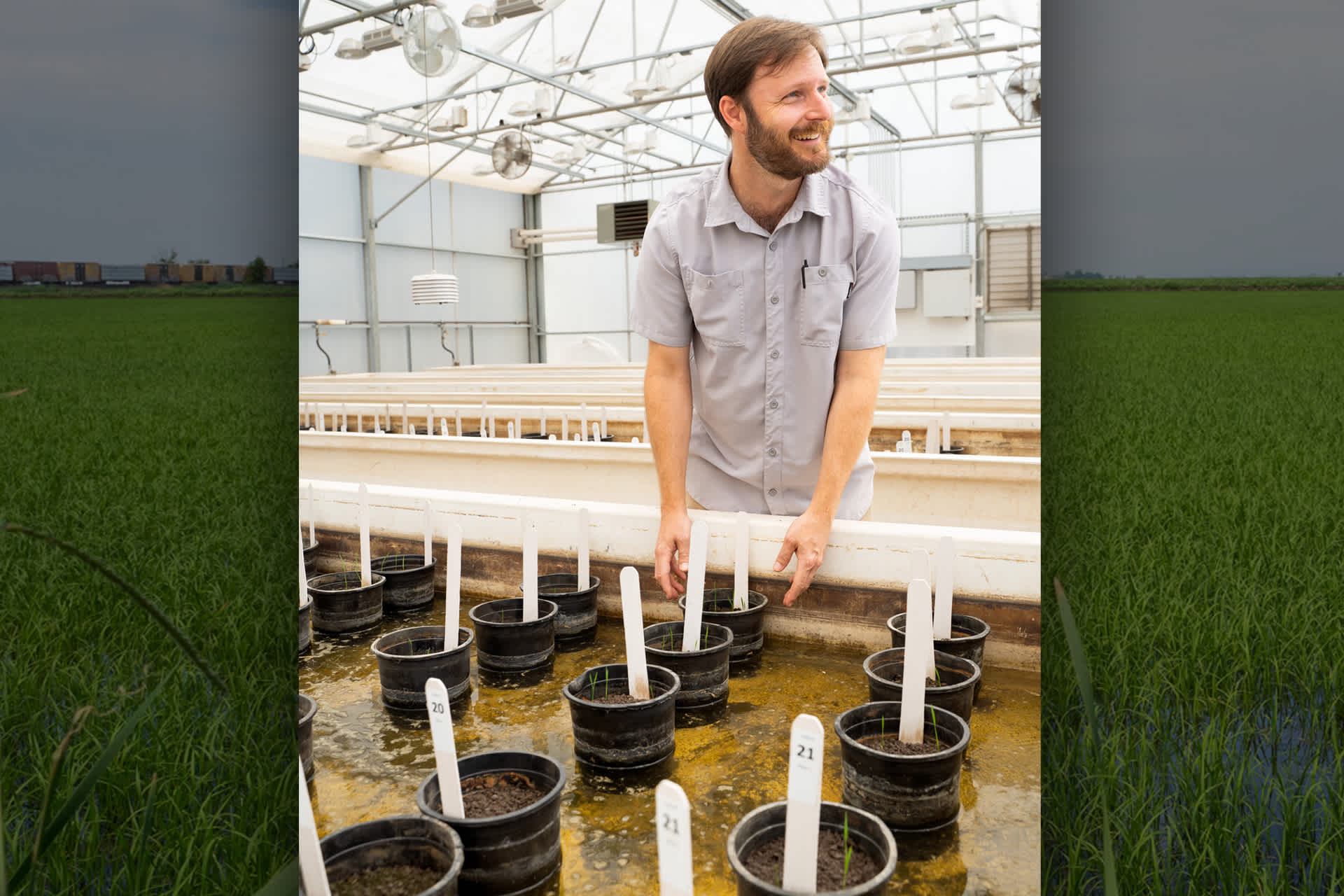Real Talk with JP Bergmann

Jean-Phillippe (JP) Bergmann is nursery research supervisor at Lundberg Family Farms, in Richvale, California. He develops new varieties of rice that are suited for organic farming. Bergmann described his work to Your Hot Job.
What does a nursery research supervisor do?
I work in a breeding nursery, in a greenhouse. That’s where we create new varieties of rice for farmers to grow. We do small-scale tests of everything the company is doing: planting, drying and storage, and milling. We’re a microcosm of the larger company. We develop rice on a small scale, and then hand off the process to the farmers, to test it in a real-world environment. My job is to coordinate all of that activity.
Our emphasis is specifically organic production. We are trying to create new varieties of rice that are more suited to being grown organically, without pesticides and herbicides. Basically, we’re cross-pollinating from more-ancient types of rice. The process is exactly what would happen in nature, except we’re doing it selectively in our greenhouse.
What’s a day at work like?
It follows the seasons, as the crops go from being planted to their vegetative and flowering stage, to maturity and harvest. Around August or September, the plants are flowering and releasing their pollen. Rice contains both male and female portions within a single flower, so it’s capable of fertilizing itself. But in the morning, the flowers are closed, and they haven’t released pollen yet. That’s my opportunity to get in there. My job is to open the flower and remove the male portion so that the flower can’t fertilize itself. Then I can select any other plant from the greenhouse and pollinate the flower myself. That allows us to do our own cross. The flower physically opens up in the afternoon. I have to be there to pollinate from a polyp donor, or a male. So my job is tied to the seasonality of the crop, but it’s also tied to a daily cycle of how the plant behaves.

What do you do for the rest of the day?
After we have crossed in the greenhouse, we grow those plants out in the field, to test them. So I’ll go out into the field and take notes on the previous year’s crosses. I spend a lot of time outdoors, wading through three or four inches of water. In the afternoon, when it’s hot, I’ll do a little office work.
What’s your work like during the winter?
When we create a cross, we have certain goals in mind. We want to improve the flavor of a rice variety, or the aroma. During the winter months, we mill the rice, which removes the hull. We look at the quality of the grain, for a beautiful shade, texture, and color—something that’s going to look beautiful in a package, and also look beautiful on your table. We compare aromas. Sometimes, we’re looking for a basmati aroma, or we’re looking for a more nutty aroma. We compare flavors, too. We’ll cook the rice and invite people from around the company to a taste test. So that’s more of a wintertime activity, where we’re not out in the field or crossing.
What is organic farming, and why is it important?
Organic farming is also called regenerative farming: leaving the land better than you found it. You’re not only avoiding damaging the environment—the plants and animals and the ecosystem in which you farm. You’re also building up that environment through your practices. Maybe that’s improving soil health. For us, that involves limiting the use of chemical herbicides and pesticides. We use only water to control weeds. Instead of spraying with chemical herbicide, we’ll raise the water. Rice is very tolerant to being submerged, a little more tolerant than the weeds are. So you can hold the water up for long enough to kill the weeds.
What set you on a career as a food scientist?
I grew up on an olive orchard [in Chico, California]. And my dad is a geologist. That combination, and also living in this region of California, got me interested in agriculture. It’s such a huge part of everyone’s daily life here. When I was 14 or 15, I was interested in music, to be honest. I went to Chico State University as a music major. That’s when I was exposed to a lot of science classes and decided to switch my major to biology. The focus of my undergraduate and master’s degrees was ecology. I love the way plants and animals interact with each other. Everything’s part of a bigger system.
What do you love most about your job?
It’s not just a hard science. There is a lot of creativity that goes into it. It has artistic aspects that satisfy the musician in me. I get to dream up an ideal rice. I have the opportunity to change something as fundamental as a staple crop. I find a lot of joy and creativity in my work. Something I would encourage kids to do, if they’re interested in agriculture, is to go out and try it. Apply for an internship at a place like Lundberg, and see if it’s something you would enjoy.
This interview has been edited for length and clarity.

